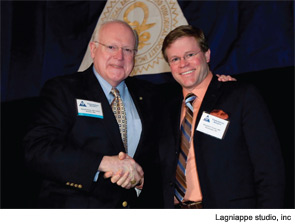
Explore This Issue
April 2012In real estate, it’s location, location, location. In research, it’s grants, grants, grants.
And for otolaryngologists looking to balance the rigors of research with the realities of clinical responsibility, there is never enough money to go around. A pair of awards from the Triological Society, one cosponsored by the American College of Surgeons (ACS), helps bridge the gap. The society, which has awarded nearly $3 million in grants since 1994, gave two new Clinical Scientist Development Awards last fall to provide $80,000 per year for up to five years to physicians already awarded a National Institutes of Health (NIH) Mentored Clinical Scientist Development Award (K08/K23). And the Society is accepting applications for the next round of Triological Society/ACS awards through May 5. (Visit triological.org/researchgrants.htm to apply.)
ENT Today recently talked to the two new awardees.
Benjamin Crane, MD, PhD, Triological Clinical Scientist Development Award
Title: Assistant professor of otolaryngology, University of Rochester, Rochester, N.Y.
Research: Dr. Crane’s research aims to characterize human motion perception as mediated by vision, the vestibular system and the intersection of the two. Dr. Crane is board certified in otolaryngology and neurotology and said the research would help otolaryngologists identify the pathophysiology of dizziness.
Question: What sparked your research into vertigo and vestibular disorders?
Answer: I came into medical school at [the University of California, Los Angeles] from a bioengineering background. I knew I was going to do both an MD and a PhD and wanted to apply engineering principles to biologic problems. I came upon a lab out there that was studying the vestibular control of eye movement. This was something that engineering principles can be applied to and something that was also very patient oriented. That really just took off for me.
Q: Is it difficult to balance research and clinical duties, even with the grant funding?
A: There’s always going to be more patients out there that want to be seen. It’s hard to draw the line sometimes in saying I really need to spend the time on the research when the clinical problems always tend to be more urgent when you have a real patient there. The problem in research is [the thought that] ‘I can always pursue this next week’; it’s easy to put that off too far.
Q: What advice do you have for early-career clinical scientists pursuing their own grants, their own labs and their own research?
Leave a Reply